#4: Mexican Hat Rock by the Applejacks
City: Guelph, ON
Radio Station: CJOY
Peak Month: November 1958
Peak Position in Guelph ~ #1
Peak position in Vancouver ~ #8
Peak Position on Billboard Hot 100 ~ #16
YouTube: “Mexican Hat Rock”
The Applejacks is a group formed by Dave Appell in 1954. Born in 1922 in Philadelphia, Appell began working as an arranger for United States Navy big bands while he was a sailor in the navy. He also worked as an arranger for African-American swing band leader Jimmie Lunceford. He also was an arranger for dance band leaders Earl Hines and Benny Carter. He formed the Dave Appell Four in 1953 and released a version of the 1928 Guy Lombardo fox trot hit “Coquette”. The Applejacks released their debut single in 1954 titled “Sweet Patootie Pie”. The other members of the band became studio musicians at Cameo-Parkway Records in Philadelphia. They were keyboardist and pianist Demetrios Pappas, Frank Day (born Francesco Cocchi), George Young (born in Philadelphia in 1937), percussionist Hector Rosado, bass player Steve Buskrone, and drummer, percussionist Vic Stevens. While the Applejacks were performing and recording singles, Frank Day was concurrently in a local Philadelphia band named Billy Duke and his Dukes who released ten singles between 1955 and 1957. In 1956, Dave Appell and the Applejacks appeared in the Alan Freed rock flim Don’t Knock the Rock.
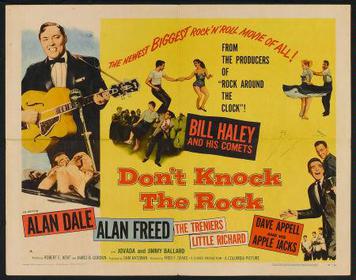
Along with the Applejacks appearing in the film were Bill Haley and His Comets, The Treniers, Little Richard, Alan Dale and Alan Freed.
In ’56, Dave Appell and the Applejacks got a gig playing in Las Vegas. They released “Teenage Meeting (Gonna Rock It Up Right)” in 1956. The single resembled the sound of Bill Haley and His Comets. It peaked at #2 in Alexandria, Louisiana, and #6 in South Hill (VA). However, the Applejacks wanted to return to Philadelphia. In 1957, Dave Appell and the Applejacks were a backing group for Charlie Gracie’s number-one hit “Butterfly”.
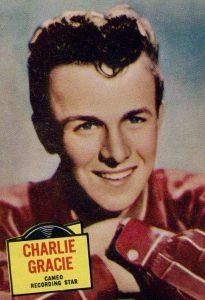
(Andy Williams successfully covered the song and also had a number-one hit with the tune).
In 1958
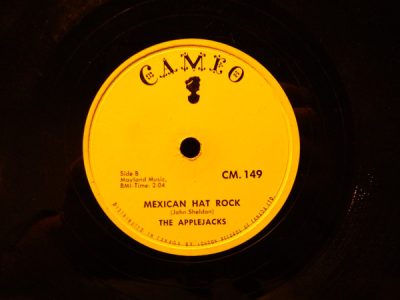
“Mexican Hat Rock” is an instrumental credited to Jon Sheldon (born Kalman Cohen). Sheldon primarily went by the alias Kal Mann. Kal Mann began his career in the 1940’s and 50’s as a comedy writer for Danny Thomas, Red Buttons and Jack Leonard. In 1955 Nat “King” Cole had a Top 50 hit with Mann’s “Take Me Back To Toyland”. In late 1956, Mann penned “Butterfly” for Charlie Gracie (also successfully recorded by Andy Williams). In early 1957, Mann wrote “(Let Me Be Your) Teddy Bear”, a number-one hit for Elvis Presley in the summer of 1957 for seven weeks. In 1958, he penned “Dinner With Drac” for John Zacherle.
Mann (aka Sheldon) wrote “Wild One” (with Dave Appell), “Good Time Baby” (with Dave Appell), “Swingin’ School” (with Dave Appell), “We Got Love”, Kissin’ Time”, “The Cha-Cha-Cha” (with Dave Appell), and “Wildwood Days” (with Dave Appell) for Bobby Rydell. He subsequently wrote “Slow Twistin’”, “Let’s Twist Again”, “Popeye (The Hitchhiker)” (with Dave Appell), “Loddy Lo” and “Limbo Rock”, all Top Ten hits for Chubby Checker. In 1962, “Let’s Twist Again” earned both Chubby Checker, Kal Mann and Dave Appell, a Grammy Award for Best Rock & Roll Recording.
For The Dovells, Kal Mann wrote the hit singles the “Bristol Stomp” (with Dave Appell) and “You Can’t Sit Down”. Kal Mann also wrote “”Mashed Potato Time” for Dee Dee Sharp. With Dave Appell, he co-wrote more Top Ten hits for Dee Dee Sharp: “Ride”, “Gravy” and “Do The Bird”. For The Orlons, Kal Mann and Dave Appell co-wrote the hit singles “South Street”, “Don’t Hang Up” and “The Wah-Watusi”. Kal Mann and Dave Appell were inducted in the Philadelphia Walk of Fame in 1989. Kal Mann (Kalman Cohen) died in 2001 at the age of 84 from Alzheimer’s disease.
However, the secondhandsongs.com website comments “The label (Cameo) credits this (“The Mexican Hat Dance”) to Jon Sheldon (Kal Mann). But there is nothing in this that would warrant treating it as its own work.” Instead, the website credits Jesús González Rubio, a professor of music in Guadalajara, who is best known for having composed the “Jarabe Tapatío” also known in the United States as the “Mexican Hat Dance”. “Jarabe Tapatío” is the national dance of Mexico. González Rubio died in 1874.
Forty-six seconds into the instrumental, the group switches from “Jarabe Tapatío” to “Oh, Dem Golden Slippers”. As a result, secondhandsongs.com credits a second composer for this Applejacks recording, James A. Bland (born in Flushing, New York, in 1854). He briefly studied at Howard University in Washington, D.C., but inspired by the spirituals and folk songs he heard performed by ex-slaves working on the Howard campus, he soon abandoned academics in favor of a career in music. A self-taught banjo player, Bland initially sought work at clubs and hotels and then turned his attention to composition and minstrel entertainment. In the 1870s, he formed the Georgia Minstrels, which was an all-black minstrel troupe. Blands Afro-American minstrel troupe, like white minstrel troupes, blackened their faces and put on red lipstick and used stereotypical exaggerated dance moves in their performances. With the Georgia Minstrels as a vehicle, Bland showcased new material he wrote. This included “Carry Me Back To Old Virginny” (1878) and “Oh, Dem Golden Slippers” (1879). The former became the state anthem for Virginia around 1908, while “Oh, Dem Golden Slippers” became an American standard today, and particularly well known now as a bluegrass instrumental standard.
Bland toured with the Georgia Minstrels to England in 1881. He remained in England until 1901, performing for Queen Victoria and the Prince of Wales. He returned to America in 1901. He died penniless in 1911 of tuberculosis and was buried in an unmarked grave. In 1939 the American Society of Composers, Authors and Publishers (ASCAP) erected a proper headstone at his burial site in Philadelphia. James A. Bland was posthumously inducted into the Songwriters Hall of Fame in 1970.
After playing a bit more of “Jarabe Tapatío”, at 1:19 in the recording the group plays fifteen seconds of “Mary Had A Little Lamb” – a melody from an excerpt from Edwin Pierce Christy‘s “Goodnight Ladies” (which he wrote in 1947 originally titled “Farewell Ladies”). Edwin Pierce Christy was born in 1815. He began his career as a minstrel in Buffalo, New York, in 1836. He got exclusive rights to performing Stephen Foster’s “Old Folks At Home” (also known as “Swanee River”) in 1854. He retired from minstrel performances in 1855. Edwin Christy operated a chain of theaters called Christy’s Opera Houses in several cities. The name of the original group, Christy’s Minstrels, was licensed for use by a new organization and became synonymous with the performance tradition of blackface minstrelsy. Fearful of financial reverses due to the upheaval of the American Civil War, Christy committed suicide by throwing himself from a window in his home at 78 East Eighteenth Street, one block east of Broadway, in Manhattan on May 20, 1862. He died the following day from his injuries.
While there are lyrics to “Goodnight Ladies”/”Mary Had A Little Lamb” and “Oh, Dem Golden Slippers”, in the Applejacks “Mexican Hat Rock” we only hear the musical snippets of these tunes.
“Mexican Hat Rock” peaked at #1 in Guelph (ON), and Boston, #2 in Rochester (NY), #3 in Albany (NY), Manchester (NH), and Buffalo, #5 in Salt Lake City, #6 in Toront0, #7 in Wheeling (WV), and Saint John (NB), #8 in Troy (NY), and Vancouver (BC), #9 in Fresno (CA), and Washington DC, #10 in Pittsburgh, #11 in Memphis, and #12 in Seattle.
A followup instrumental in 1958 was “Rocka-Conga” which was a Top 40 hit in Toronto and Vancouver. In the USA the tune was a Top Ten hit in Arlington (VA), Alexandra (VA), Pittsburgh and Bethesda (MD). In 1959, “Bunny-Hop” was a Top 50 hit in Ottawa, Vancouver and Toronto.
In 1960, the group released an instrumental titled “Theme From The Young Ones”. It was a Top 40 hit in Vancouver (BC). In 1961, Dave Appell and the Applejacks had a Top 20 hit in Portland (ME) titled “Happy Jose”. In this period they also had some regional successes in radio markets in Canada and the USA with “Mexican Hat Twist” (1961) – a minor hit in Winnipeg, “Circle Dance”(1959) and “The Untouchables” (1960) which was a minor hit in Vancouver.
Frank Day became a manager for Bobby Rydell and later Helen Reddy.
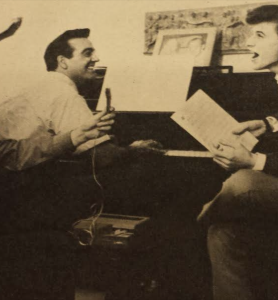
1959 photo: Frank Day (left) and Bobby Rydell (right)
Day worked for Cameo-Parkway Records and later moved from Philadelphia to Los Angeles. In 1970, he was the music director for the film Rabbit Run, and recorded the theme music for the film performed by the Frank Day Habit. Day moved to Hawaii by 1979 and continued to work in the music industry as a performer and promoter. Hector Rosado was briefly in the Bronx doo-wop group The 5 Shadows in the early 60s.
In 1992, Vic Stevens established Giant Steps Recording in Oceanville, NJ. He later formed Vic Steven’s Mistaken Identities in the 2000s. By 2010 Stevens was playing in Rick Lawn’s Power of Ten.
Steve Beskrone was in a number of bands, including the Monnette Sudler Trio. From the mid-90s to the mid-2000s, Demetrios Pappas was a member of Vic Stevens’ Mistaken Identities. Pappas was also a member of Ed Vezinho/Jim Ward Big Band (also with Steve Beskrone) in the 2000s and another band called Cintron.
George Young separately released several singles as a solo artist and in his own groups between the late 50s and early 60s. These included his debut single “Nine More Miles (Faster, Faster)”, was a Top Ten hit in 1958 in Boston, Buffalo, and Janesville (WI). A minor hit in 1959 was “Two Weeks With Pay”. Aside from these songs with lyrics, George Young turned his attention to instruments including “Birdland Holly Gully” (credited in 1961 as Georgie Young). In 1962, George Young released a debut album titled Presenting the Unbelieveable George Young. He performed with his George Young Review for 14 years at the Rainbow Club in Wildwood (NJ).
In the late 60s, George Young joined an experimental ensemble called The White Elephant Orchestra. In 1974, he was a session musician on James Taylor’s Walking Man album. In 1976, he played soprano, alto, tenor saxophone, and flute solos on the disco hit “A Fifth of Beethoven” by the Walter Murphy Band. He has also been a session musician for recordings by Maynard Ferguson, Quincy Jones, Walter Bishop Jr., Dr. John, Yoko Ono, former lead vocalist for Mott the Hoople, and jazz singer Christy Baron. Later, he became a member of the Saturday Night Live Band from 1991 thru 1996 on alto, tenor, soprano and sopranino saxophones, the clarinet, flute, alto flute and piccolo. He was also a member of the Manhattan Jazz Quintet, the Louis Bellson Quintet, the Flying Monkey Orchestra, and the Manhattan Jazz Orchestra.
Over the decades, Young performed as a sideman on tour with Eric Clapton, Mariah Carey, Luciano Pavarotti, Mick Jagger, John Lennon, James Brown, Frank Sinatra, Madonna, Tony Bennett and others.
June 7, 2025
Ray McGinnis
References:
“Dave Appell and Kal Mann,” Philadelphia Music Alliance Walk of Fame, November 2001.
Dave Appell & the Applejacks, “Teenage Meeting (Gonna Rock It Up Right)“, President Records, 1956.
Georgie Young and the Rockin’ Bocs, “Nine More Miles (Faster, Faster)“, Cameo Records, 1958.
Dave Appell and the Applejacks, “Happy Jose“, Cameo Records, 1961.
Applejacks, “Theme From The Untouchables“, Cameo Records, 1960.
Applejacks, “Mexican Hat Twist“, Cameo Records, 1961.
“Edwin Pierce Christy,” Wikipedia.org.
Shannon Erickson, “James A. Bland (1854-1911),” Black Past, June 27, 2008.
“George Young – Musician and Composer: Wildwood,” Georgeyoungmusic.com.
“Sights and Sounds,” Philadelphia Daily News, October 26, 1970.
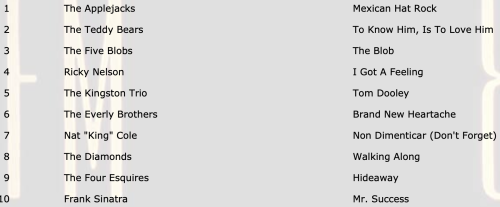
CJOY 1460-AM Guelph (ON) Top Ten | November 15, 1958

Leave a Reply